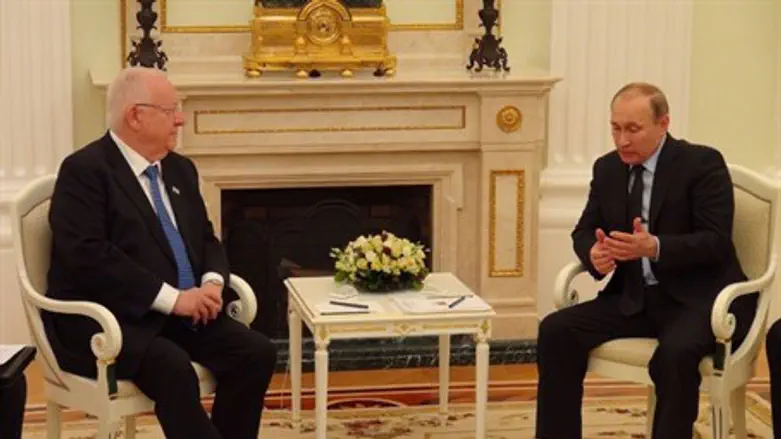
Thursday’s meeting in Moscow between Prime Minister Binyamin Netanyahu and Russian President Vladimir Putin took place following as recent aerial incident between the two countries.
The incident took place in recent days, when a Russian jet was scrambled to intercept an Israeli aircraft which was flying along the Syrian coast.
The two aircraft did not make contact with one another.
During the meeting in Moscow between the two leaders, it was agreed that the commander of the Israel Air Force, Gen. Amir Eshel, and Netanyahu’s senior military adviser, Brigadier General Eliezer Toledano, will hold a special meeting with Russia's defense minister and several other generals.
Netanyahu clarified to Putin during the meeting earlier Thursday that keeping the Golan Heights in Israeli hands is a "red line."
"I came here with one central goal - to strengthen the security coordination between us in order to prevent mishaps, misunderstands, unnecessary crashes," he said, referring to how the Russian military is currently operating near Israel in Syria to prop up Bashar Al-Assad's regime.
The Prime Minister focused in on the Golan Heights, which has been in the news this week after on Sunday he held the first Cabinet meeting there since the region was liberated in the 1967 Six Day War. His meeting sparked an international backlash of condemnation, and in it he vowed that the Golan would always remain Israeli.
"Regarding the Golan Heights, we will not return to the days when they fired on our towns and our children from the peaks of the Golan," Netanyahu told Putin on Thursday.
"Therefore, with an agreement or without an agreement, the Golan Heights will remain under Israeli sovereignty."
Netanyahu held a press briefing after his meeting with Putin, in which he stated that in the meeting with Putin significant achievements were made for the security of Israel.
"I finished a very important meeting with President Putin - very important for the security of Israel," said Netanyahu in a briefing afterwards for political correspondents.
"Putin suggested that the (Israeli) Air Force commander and my military secretary meet with his defense minister, and they went out there and discussed constructive cooperation between our armies on several issues that were raised."
Netanyahu said that the cooperation "is essential because we have to preserve the freedom of activity of the IDF and the Air Force in places that are important to us - and I think this matter was achieved."
When asked if there were any significant problems in the coordination of the armies, he said, "Problems were raised. From the very nature of things there is always friction, and if we don't deal with it, it is liable to develop into something a lot larger, and we've seen things like that in the past."